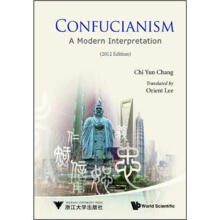孔学今义(英文版)

Foreword vAbout the AuthorsviiChapter 1 Confucius Was Great1.1 His Great Personality1.2 His Humanism1.3 First Democratic Educator1.4 An Accomplished Philosophical Man1.5 Inauguration of a New Era1.6 The Four Steps1.7 Aim at the Dao1.8 Build up a Base with Virtue1.9 Rely on Ren1.10 Relax in the Arts1.11 Man’s Mind, Nature, and Sentiments1.12 Learning, Knowledge, Intuition1.13 Action1.14 Have a Sincere Will1.15 Happiness in the Dao1.16 The Middle Way1.17 To Be a Sage Inside and a King Outside1.18 People Are Masters1.19 Confucianism and the Idea of Revolution1.20 Great Harmony1.21 Lineage of Confucianism1.22 A Confucianist Century for the WorldChapter 2 Philosophy of Life2.1 A Humanist Philosophy2.2 Ren, a Concept Created by Confucius2.3 Righteousness: Its Relationships with Ren,with Courage, with the Li, etc.2.4 Filial Devotion2.5 Trustworthiness2.6 Loyalty and Empathy2.7 Public Spirit and Straightforwardness2.8 Respect and Sincerity2.9 Calmness and Firmness2.10 Thrift, Modesty, and Willingness to Yield2.11 Seeing a Man’s Merit Through His Faults2.12 Overcoming One’s Self in Order to Get Back to the LiChapter 3 Philosophy of Education3.1 The Goal of Education3.2 The Systems of Education3.3 Equality of Opportunity in Education a New Trend in the 20th Century3.4 National Homogeneity Through Education3.5 Upholding Man’s Virtuous Nature3.6 Learning about the Dao Through Inquiry and Practice3.7 Grasping the Vast and Big3.8 Exhausting the Subtle and Abstruse3.9 Textbooks and Curricula3.10 Methods of Instruction3.11 The Way of a Teacher3.12 Friends as Teachers3.13 Giving Education to More People3.14 Character-BuildingChapter 4 Political Philosophy4.1 The People Are Important4.2 Heaven’s Mandate Is Revocable4.3 Notions of Liberty and Equality4.4 Governing a Country with the Li4.5 Rectifying the Names4.6 Politics and Education4.7 Politics and Ethics4.8 Administration by the Elite4.9 The Way of a Statesman4.10 Secrets of Efficiency4.11 The Problem of Public Opinion4.12 Self-Cultivation4.13 Regulation of the Family4.14 Self-Government on the Xiang Level4.15 How to Govern a Whole Country4.16 Confucianism and Dr. Sun’s Three Principles4.17 Pacification of the World4.18 Da-tong (Great Harmony)Chapter 5 Philosophy of Law5.1 The Place of Law in Chinese Culture5.2 The Li versus the Law5.3 The Three Classics on the Li5.4 Some Stimulating Comments on the Li5.5 The Li and the Natural Law5.6 The Writing and Publication of the Law5.7 Applications of the Law5.8 Judges5.9 The Legalists5.10 Some Principles in Chinese Law5.11 The Chinese Legal SystemChapter 6 Philosophy of Art6.1 A Country Dedicated to the Li and the Yue6.2 Harmony, the Spirit of the Yue6.3 Confucius the Artist6.4 Songs and Dances6.5 Poetics6.6 Diction in Prose6.7 A Further Discussion on Music6.8 Masters of the Yue6.9 Musical Instruments6.10 A Further Discussion on the Dance6.11 Painting6.12 Physical Culture6.13 Living with Nature6.14 Aesthetics and EducationChapter 7 Philosophy of Change and of History7.1 Theories and Facts7.2 The Book of Changes : Its Own History7.3 The Yin and the Yang, the Ultimate Being, and the Ultimate Nothingness7.4 Change, No-Change, Simplicity7.5 The Virtue of Modesty7.6 Rising up from Trouble7.7 Lessons from The Book of Documents7.8 An Interpretation of History7.9 Chun-qiu7.10 Using the Right Words7.11 Upholding National Unity7.12 Curbing the Barbarians7.13 The Three Commentaries of the Chun-qiu7.14 A Great Tradition: Historians’ IntegrityChapter 8 Military Philosophy8.1 Confucius Was a Knight8.2 Preparedness8.3 Defense Through Virtue8.4 A Ren Man Can Never Be Defeated8.5 Using Kindness to Put an End to Troubles8.6 A Ren Man Has to Resist Aggression8.7 Wang Yi, a Boy Who Died for Lu8.8 Ran Qiu, Scholar-soldier8.9 Zi-gong, an Adroit Diplomat8.10 Cautiousness and Careful Planning8.11 Military Organization During the Middle Zhou8.12 A Pact for Permanent PeaceChapter 9 Religious Philosophy9.1 Heaven’s Dao9.2 Tian9.3 The Orders from Heaven9.4 Heaven and Man Are One9.5 Reverence for Heaven and Love for Man9.6 Filial Piety9.7 Life and Death9.8 Sacrificial Ceremonies9.9 The Catholic Appraisal of China’s Religious Tradition9.10 Confucius Prayed9.11 Is Confucianism a Religion9.12 The Confucianist Motto: Be SincereChapter 10 The Model Types of Men by Confucian Standards10.1 Perfection Was the Aim10.2 The Ru (儒), Scholar with a Principle10.3 The Good Men, the Accomplished Men, and the Great Men10.4 The Shi (士), Knight-Scholar with a Purpose10.5 The Jun-zi (君子), Perfect Gentlemen10.6 The Xian-men (贤人), the Worthy Ones10.7 The Sheng-men (圣人), the Sages10.8 The Sages in Legendary Times10.9 The Five Ren-men (仁人) of Shang10.10 The Sages and the Xian-men of Early Zhou10.11 Guan Zhong and Zi-chan10.12 Liu-xia Hui and Qu Bo-yuChapter 11 The Disciples of Confucius11.1 The Number of Disciples11.2 Their Geographical Origins11.3 Their Years of Birth11.4 The Ten Disciples with Four Kinds of Specialties11.5 Yan Yuan11.6 Min Zi-qian, Ran Bo-niu, and Zhong-gong11.7 Zai Wo and Zi-gong11.8 Ran You and Zi-lu11.9 Zi-you11.10 Zi-xia11.11 Zeng Shen11.12 Zi-zhang11.13 Some Other Disciples11.14 EpilogueChapter 12 Confucianist Lineage12.1 A Main Stream in Chinese Cultural History12.2 Beginnings of Confucianism12.3 The Spread of Confucianism12.4 Confucianism During the Warring States Periods12.5 Confucianism During the Han Dynasty12.6 Confucianism During the Wei, Jin, Southern and Northern Dynasties12.7 Confucianism During the Sui Dynasty12.8 Confucianism During the Tang Dynasty12.9 Confucianism During the Northern Song Dynasty12.10 Confucianism During the Southern Song Dynasty12.11 Confucianism During the Yuan Dynasty12.12 Confucianism During the Ming Dynasty12.13 Confucianism During the Qing DynastyChapter 13 Classics and Memorials13.1 Confucius the Educator and Confucius the Author13.2 The Book of Changes13.3 The Book of Songs13.4 The Book of Documents13.5 The Chun-qiu and Its Three Commentaries13.6 The Three Classics on the Li13.7 The Xiao-jing13.8 The Four Books13.9 The Great Learning13.10 The Analects13.11 The Mencius13.12 The Doctrine of the Mean13.13 Evaluation of Ancient Texts13.14 The Confucian Temple and the Confucian Forest at Qufu13.15 Honors and Ceremonials Conferred on Confucius and the Outstanding Confucianists13.16 Birthday of Confucius and Teachers’ DayChapter 14 Confucianism in Eastern Nations14.1 Confucianism and Eastern Culture14.2 Cultural Contacts Between China and Korea14.3 Silla and Its Flower Youths14.4 Confucianism in Koryo14.5 Confucianism in Yi’s Chao-xian14.6 Korea’s Achievements in Music14.7 Cultural Contacts Between China and Japan14.8 Confucianism in Japan Prior to the Sui and the Tang Dynasties14.9 Confucianism in Japan During the Sui and the Tang Dynasties14.10 Confucianism in Japan from the Song Dynasty to the Ming Dynasty14.11 Zhu Shun-shui’s Academic Activities in Japan14.12 Confucianism in Contemporary Japan14.13 The Confucian Temple at Yushima and the Shibun Kai14.14 The Tenri University14.15 Confucianism in Ryukyu14.16 Confucianism in VietnamChapter 15 Confucian Studies in Western Countries15.1 Confucianism and Western Culture15.2 The Early Catholic Missionaries in China15.3 Translations of the Confucian Classics by Catholic Missionaries and Their Other Writings Concerning China15.4 G. W. Leibnitz15.5 Voltaire15.6 Confucian Studies in England from Johnson to Toynbee15.7 Confucian Studies in Italy, Spain, Portugal, the Netherlands, and Sweden15.8 Confucian Studies in the United StatesChapter 16 The Period of the Spring and Autumn:A General Survey16.1 The Zeitgeist of the Period of the Spring and Autumn16.2 Major Events During this Period: A Very Brief Chronology16.3 Regions and States16.4 Cultural Assimilation and Territorial Expansion16.5 Geographical Distribution of 42 Famous Persons16.6 Government by the Li16.7 Guan Zhong16.8 Zi-chan16.9 Lao-zi16.10 The Most Important Contributions Made by Confucius16.11 The Great Synthesizer, the Most Sagely Sage, and the Revered Teacher16.12 Spread of Confucian Teachings to Other Parts of the WorldAppendixBibliography1. Books in Western Languages2. Books in ChineseIndex
张其昀先生(1901-1985),字晓峯,浙江鄞县人。1919年考入国立南京高等师范学校(1921年改建为国立东南大学,1928年更名为国立中央大学),史地部师从哲学大师刘伯明、史学大师柳诒徵、地学大师竺可桢等人。1927年起在国立中央大学(1949年更名为南京大学)地理学系任教,曾主讲中国地理,为中国人文地理学的开山大师。1936年转任浙江大学教授,创办浙江大学史地系和史地研究所,任史地系主任、史地研究所所长。1943年到哈佛大学研究和讲学,1945年回国后,任浙江大学文学院院长。1962年,于台北华冈创办中国文化大学。张其昀先生是史地学家、政治家,且是伟大的教育家,更是中国现代人文地理学的开创人,一生著述丰硕,有专著上百种,中文论文1000余篇,英文论文100余篇。主要著作有《中华五千年史》《中国军事史略》、《中国民族志》、《中国经济地理》、《中国区域志》等,大部分收录于《张其昀先生文集》。又筹编并监修《中文大辞典》,风行全球华人地区。
《孔学今义(英文版)》一书是张其昀先生的巨著《中华五千年史》之第五册,也就是《春秋史》的后编。作者张其昀先生为当代著名的历史学家,为中国文化大学的创办人,一生以发扬中华文化为最大理想。其所撰著的《孔学今义》就是要解释孔子学说的时代意义,为孔子学说现代化作解释、引申与发扬,进而为中化新文化的远景做一展望。全书共分大哉孔子、人生哲学、教育哲学、政治哲学、法律哲学、艺术哲学、历史哲学、军事哲学、宗教哲学、孔子理想的人格、孔门弟子、孔子之学统、儒家的典籍与纪念、孔学对东方诸国的贡献、孔学对西方诸国的贡献、孔子世纪等十六章。中华五千年的历史中,孔子学说是承前启后的枢纽。孔子学说经过《孔学今义》圆融的叙说,阐明孔子“明人伦”、“兴教学”、“创著作”、“宏政治”、“昌天道”、“开太平”六大要点,表彰孔子不但为中国的至圣先师,亦为全人类的圣人。《孔学今义》英文本邀请了史学大师,中国文化大学黎东方教授翻译,再请英文研究所丁善雄所长等进行修订所成。《孔学今义》英文版忠实地再现了原著的精髓所在,同样具有很高的学术价值和文化价值,是国外学者了解儒家思想和中华文化很好的参考。
比价列表价格走势
公众号、微信群
 缺书网
缺书网微信公众号
 扫码进群
扫码进群实时获取购书优惠







